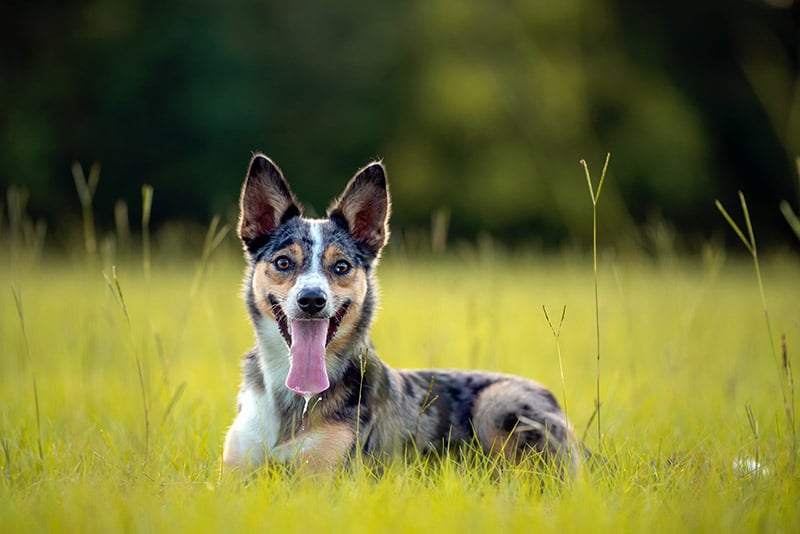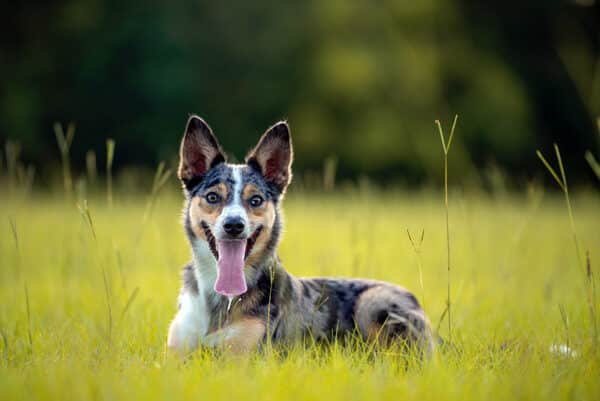Click Below to Skip Ahead
The Koolie dog can go by many names, like the German Coolie or Australian Coolie. Koolie is a name we think is much ‘kooler’ than those choices—pun intended. It is an Australian breed that dates to the 19th century. This gorgeous, dusty-coated dog has some pretty awesome traits that have gained their place in the canine world.
This classic dog is popular for a variety of reasons, from herding to offering irreplaceable companionship. Versatile and personable, the Koolie is a cool dog, in our opinion. Let’s get to know the breed better.
Breed Overview
Height:
13–24 inches
Weight:
30–55 pounds
Lifespan:
12–18 years
Colors:
Merle, black, red merle, blue merle, tri-merle, chocolate, black merle, tri-color, red
Suitable for:
Active families, those looking for a low-shedding dog
Temperament:
Loyal & loving, intelligent, easy to train, friendly, gets along with other pets
Koolies have some of the neatest coloration, giving way to special litter after special litter. Each one has its own individual look, setting them apart from all others of the breed, including parents and siblings. Not only are they physically stunning, but they are also smart, loyal, and incredibly affectionate.
Ultimately, the Koolie loves being part of a family! So, if you have room for this rascal to run, you might have found your newest family member!
Koolie Characteristics
Koolie Puppies
Koolie pups will be curious, alert, and active. At 8 weeks, when you bring your puppy home, you will be surprised at how quickly they grow. Koolies, surprisingly to some, don’t get very big. These are considered medium-sized dogs and generally weigh an average of 30 pounds when fully grown.
Since certain coat colors can lead to blindness or deafness in the breed, most breeders will test the litter around 5 1/2 to 6 1/2 weeks. So, if your dog has special needs, you will know this when you pick them up as puppies.
The Koolie might be a very popular breed in Australia, but it is less abundant in other parts of the world, including in the United States. That’s not to say that U.S. citizens don’t appreciate and enjoy this breed.
However, you might have to do some hunting to track one down. Getting a Koolie might mean lengthy travel, paying for pricey shipment, or simply accepting that you won’t be able to have a Koolie until a breeder moves closer to your area.
You may find a Koolie or Koolie mix at a rescue or shelter. While you might not be able to 100% verify the identity, you certainly can appreciate the resemblance.
Temperament & Intelligence of the Koolie
The Koolie has a fantastic temperament that melds with a variety of lifestyles. For this reason, it makes an excellent pet for various people. The Koolie is a very keen and aware breed, making it an incredible watchdog or family protector.
While small, they are quick to react and are suited for keeping things around the household in line. These dogs are highly dedicated and devoted to their masters and take their role in the family very seriously. Even though Koolies can get along with strangers, they might act indifferent or even shy toward them.
Koolies are typically never aggressive, though you should always err on the side of caution anytime you introduce your Koolie into a new situation. This dog is certainly capable of learning a variety of things, as much as you’re willing to teach them. They can be used for utility, service, or simply companionship. The Koolie doesn’t like to slow down, so they work best in homes with a purpose to fulfill.
Because the Koolie is a herding dog, they tend to nip at heels. This can impact both children and pets, so simply be aware of this breed instinct. They mean no harm by this, but they can pinch or hurt a child or pet by accident.
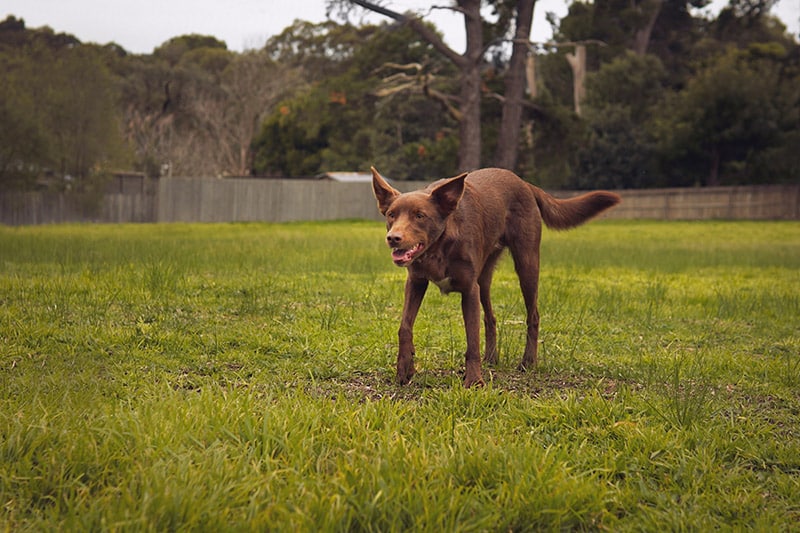
Are These Dogs Good for Families? 👪
The Koolie can make an amazing family addition! They are suitable for a wide variety of lifestyles and can acclimate well to several different living situations. Since they are hurting dogs, they are very comfortable on the farm, keeping any livestock, big or small, in line.
They love living in rural areas so that they can adventure and stretch their legs. When trained, these dogs typically learn their territory very well. However, you always need measures to ensure that your Koolie doesn’t wander off your property and get into mischief elsewhere.
They can equally make a fantastic dog for children. Younger children should always be directly supervised and taught to respect the animal before interacting. However, Koolies tend to appreciate the child’s energy and love having a companion to run around with. So, a Koolie might very well be your child’s first best friend.
The Koolie wouldn’t really work in a situation where they are kept in a kennel all day. This active breed needs to be out stretching their legs and will become stressed or even destructive if they are enclosed for a long period of time.
Does This Breed Get Along With Other Pets? 🐶 😽
The Koolie is typically very good-natured. They are generally agreeable with other animals, although they have herding instincts. They might try to hurt other animals around your area, which can be misunderstood as aggression.
However, these dogs are typically very laid back, understand the existence of other species, and accept them. However, you should never leave your Koolie around a small cage animal that they could hurt by mistake.
Your Koolie is still very prey-driven and might accidentally hurt a smaller animal, even if they do not mean to. Typically, the Koolie will do perfectly well with a cat they were raised with. However, they might chase or taunt strange cats around the neighborhood.

Things to Know When Owning a Koolie
Food & Diet Requirements 🦴
The Koolie is a very active dog. Since they typically deplete many calories in one day, they need a high-quality, protein-rich diet to counteract that. No matter their life stage, they will need a recipe that aims to fit the nutritional needs of each dog.
Dry kibble and wet canned food definitely have their benefits and downfalls. There are still several viable selections on the market, and the science behind the recipes seem to get better all the time. What’s really hot in the dog food world is fresh food.
Often, these are subscription-based services and tend to be pricier than traditional choices. You can also make dog food yourself or try raw food diets. We recommend checking with your veterinarian before serving these recipes to your dog.
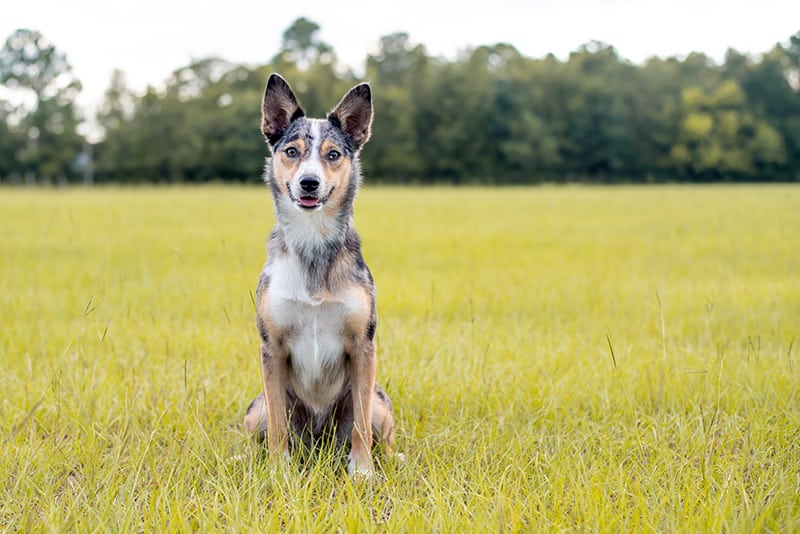
Exercise 🐕
The Koolie will definitely require a decent amount of exercise in a day. However, when they are exercised properly, they are generally very calm indoors. They do best with approximately 90 minutes of exercise per day.
During their puppy and juvenile stages, they might be a little more hyper than some would like, but they generally become very well-rounded adults. The Koolie will enjoy many outdoor activities that stimulate their senses. They love everything from strict outdoor training to leisurely walks.
Be prepared to have a fenced-in backyard, invisible fence, or some other means of containment. While these dogs are not notorious runners, they love adventure and can easily get themselves into trouble. To keep them safe, make sure you have a secure area.
Training 🎾
The Koolie is a highly intelligent breed that can easily pick up on concepts. If you’re ready to train your Koolie, you can easily do so, and you should breeze right through the potty training and basic commands.
Koolies are so easy to handle, loyal, and alert that they make great service dogs in areas like bomb detection, and they can even easily enter sports like agility, utility, endurance, and working.
Sometimes, Koolies can take a bit of time to mature, making their prime training window up to 2 years.
These dogs can really excel at dog sports, so if you want to pair exercise with training, you can practice agility, obedience, tracking, flyball, or even therapy work. These dogs have impeccable focus and enormous potential.
Grooming ✂️
Something you have likely already recognized about the Koolie is that they often have one blue eye and one eye of another color. This condition is called heterochromia and is a characteristic of the breed.
Their coats usually come in merle, solid, bicolor, or tricolor. They are short to medium in length and often easy to groom. Brushing is necessary for this dog as it sheds continuously year-round.
You should always have different brushes that serve different purposes. For example, a slicker brush is fantastic for everyday use, collecting shed and clearing the coat of debris. Bristle brushes help evenly distribute oil on the coat. Usually, they are made of animal hair or synthetic plastics.
Another great resource to have on hand when you have a Koolie is a deshedding tool. Since these dogs shed a lot, this tool can be used after baths every 4 to 6 weeks. It penetrates the skin, raking away any debris or dead fur.
While the Koolie is not notoriously allergy-prone, it’s still best to buy them fragrance and chemical-free products to ensure safety and comfort. Remember to regularly brush their teeth, clip their nails, and clean their ears to keep things tidy and prevent infection.
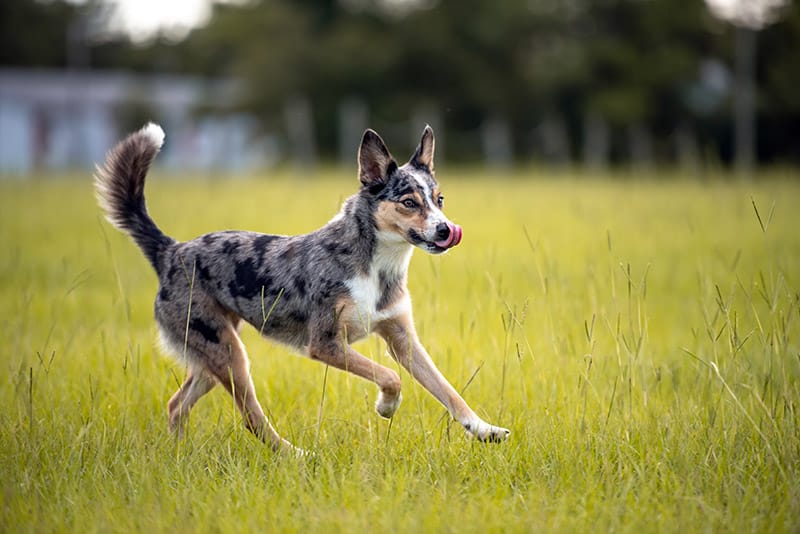
Health and Conditions 🏥
Koolies are built to be sturdy dogs. They are known to have very few health concerns to mention, although every dog can develop issues throughout their lifetime. The best way to stay ahead of any health issues is to take your dog to all routine vet checkups.
Consider vet care as important as ensuring you’re going to your annual doctor’s appointment. Vets can tell so much about the health of our pets by simple blood work or examination. So, your Koolie is certainly better off not missing any essential checkups.
Many families are now opting for pet insurance for their dogs. It is an extra means of protection to ensure the longevity and safety of your animal.
One of the things that likely draws you to the Koolie is their beautiful merle coats. Unfortunately, this particular coat can lead to genetic deafness or blindness.
- UTI
- Ear infection
- Blindness
- Deafness
- Cancer
- Diabetes
- Arthritis
Male vs Female
The most obvious difference between a male and female Koolie will be their size. If you see a male and female standing next to each other, you might notice that the male is a bit heftier and larger than the female. Females tend to be a bit more sleek and dainty.
That is not to say that they can’t be very similar sizes. They absolutely can and you might have a female Koolie that is bigger than the male, while this is rare. Personality-wise, there aren’t a lot of definitive traits based on sex.
However, as a whole, males stay in the puppy stage longer than their female counterparts and may, therefore, be harder to train. This is circumstantial and should not influence your decision on what sex to purchase.
3 Little-Known Facts About the Koolie
1. The Name “Koolie” Is a Mispronunciation of Collie
It seems the term “Koolie” stems from the German accent attempting to say “Collie.”
2. A Koolie Is a Herding Dog
A Koolie was originally a herding dog that rounded up sheep for farmers.
3. It Is Said That Koolies Act with Intention
When they look into their human’s eyes, there is an intense connection there that is hard to describe.

Final Thoughts
How do you feel now that you’ve gotten to know the Koolie a little better? This Australian breed is certainly one of great versatility. Not only do they make amazing family companions, but they can learn just about any concept you want to teach them. The Koolie is a wonderful, highly docile breed that thrives on the companionship of people and respects animals of varying kinds.
If you are the kind of person who has room for this breed to explore and you can spend a lot of time with them, it is undoubtedly an interesting and phenomenally capable canine.
Featured Image Credit: Tanya Consaul Photography, Shutterstock

